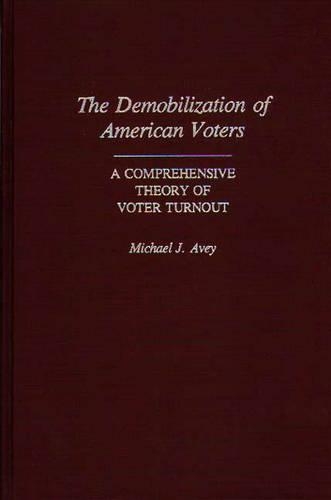
The Demobilization of American Voters: A Comprehensive Theory of Voter Turnout
(Hardback)
Publishing Details
The Demobilization of American Voters: A Comprehensive Theory of Voter Turnout
By (Author) Michael J. Avey
Bloomsbury Publishing PLC
Praeger Publishers Inc
8th December 1989
United States
Classifications
Tertiary Education
Non Fiction
324.973
Physical Properties
Hardback
162
Description
This book presents an alternative empirical theory of voter turnout. Named the Mobilization/Demobilization Theory, it analyzes voter turnout of different segments of the voting age population in terms of barriers created to prevent participation and efforts to stimulate participation. This study challenges the theory that the characteristics of nonvoters, low levels of education and political apathy, are the root causes of poor voter turnout among persons of low socioeconomic status (SES). The Mobilization/Demobilization Theory argues instead that nonvoting results from the behavior of politicians, political elites, and the political system and not from the characteristics of the poor and working class. The study suggests that voter turnout for national elections could reach an 80 percent level if a major party focuses on these two groups. Statistical evidence is given to show why the poor and working class do not vote when neither party represents them. Chapter One of the book presents the evidence against the current theory of voter turnout--the Standard Socioeconomic model. Chapter Two presents the alternative theory--the Mobilization/Demobilization model. Chapters Three and Four cover the issues of removing obstacles to voting and nonpolicy related organizational efforts. This is followed by a discussion in Chapter Five of the major party focus of nonparticipators and a discussion in Chapter Six of the impact of party alignment. The final chapter takes a look at mobilization and demobilization today. This book makes for informative reading to anyone interested in political behavior, public opinion, electoral politics, or political parties. It should be of special interest to persons active in election activity, from grassroots organizers to persons making election regulations.
Reviews
In The Demobilization of American Voters, author Michael J. Avey argues that low voter turnout among people of low socioeconomic status results not from lack of education and political apathy, but from the behavior of politicians, political elites, and the political system. In essence Avey contends that "the poor and working class do not vote when major parties fail to represent them."-Legislative Information Alert
"In The Demobilization of American Voters, author Michael J. Avey argues that low voter turnout among people of low socioeconomic status results not from lack of education and political apathy, but from the behavior of politicians, political elites, and the political system. In essence Avey contends that "the poor and working class do not vote when major parties fail to represent them.""-Legislative Information Alert
Author Bio
MICHAEL J. AVEY is currently teaching Political Science at Northern Kentucky University and previously taught at the University of Southern California.
